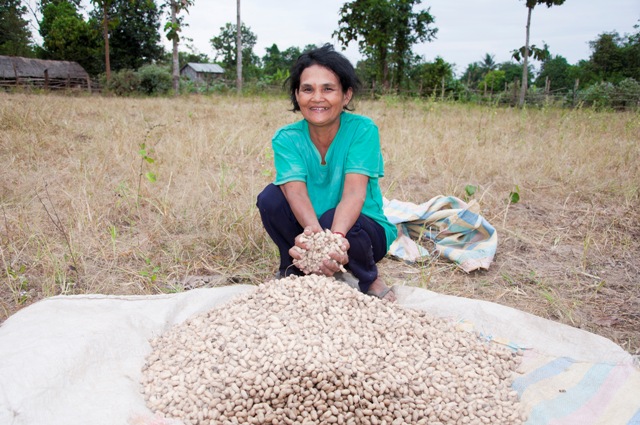The establishment of community-based micro credit structures such as village banks, self-help groups, agricultural cooperatives, or other forms of social saving creates favorable conditions for the rural poor to seek for financial support. It would also be able to help them move out heavy debt through the reduction or halt in the use of high interest rate loans from the bank, especially from the private lenders.
|
|
|
|
|
|
Ms. Lorm Savuon, 51, from Phteah Rung village, Phteah Rung commune of Phnom Kravanh district in Pursat province, highly valued the key roles and advantages of the agricultural cooperative. Under LWD’s support and with strong cooperation from the Agricultural Ministry, in October 2011 a so-called community-based micro credit structure, named “Phteah Rung Rungroeung Agricultural Cooperative (PRRAC)” was established in her village.
“The cooperative is very advantageous. Its members can take loans to set up or expand their on-farm or off-farm business as needed. The lending procedure is very simple. No collateral is needed,” she said, adding that more over the interest the borrower paid in would be proportionally returned to the members and dividend would also be shared at every year end.
She said that she used to borrow some money from a local bank five times—about $100 each time—for promoting her farming business. But, she had to leave her land title or some cows as collateral at the bank. It took longer time to get the loan, she said.
Ms. Savuon said in late 2011 she borrowed $125 from the cooperative. The loan was used to cover the expense on peanut seeds and clearing the land for growing peanuts on her half hectare of land. For the first planting period of three months she generated a net income of $200 from the sale of her peanut yield and of the same amount for the second plantation. Then, she spent all the income buying some woods to preserve for building her new house next year.
In late June 2012, she borrowed the same amount of money from the cooperative again. She used part of the loan for expanding her peanut business and the rest for clearing another plot of land and buying cassava saplings to grow. She started growing cassavas in early December 2012 and planned to harvest in November next year. She expected to get 20 tons of cassavas and earn about $1,000 from the sales, she said.
Ms. Lao Chanreth, Manager for PRRAC, said the cooperative helped its members to some extents since established. Most members took loans from the cooperative to set up or expand their business.
The PRRAC comprised 147 members from four villages in the commune and 270 shares worth 5,252,000 riels ($1,313). To become a member of the cooperative, each farmer is required to pay a membership fee of 2,000 riels ($0.50) and buy at least one share worth 20,000 riels ($5), according to their by law.
Each member is also required to deposit their savings in order to increase the capital of the cooperative. As of September 1, 2012, the total deposit was amounted to 4,788,500 riels ($1,197).
In addition, LWD granted 28,000,000 riels ($7,000) to PRRAC for supporting the start up process as part of the Women: Hope and Growth Project funded by Finn Church Aid (FCA).
Ms. Chanreth said that besides providing loans for its members, the cooperative acted as an intermediary to purchase fertilizers from a company and sold them to its members.
In early July, as agreed by the members, she bought 4,198 sacks of fertilizers worth 41,980,000 riels ($10,495). The fertilizer was sold on credit to the members over a six month term at 118,000 riels ($29.50) per sack—an 18% add-up price. It was 10,000 riels ($2.50) lower, if compared to the credit sale made by other middlemen over the same period.
She said at the end of the payment period, the cooperative generated a net income of 7,720,000 riels ($1,930) from the sales of fertilizers.
Under the management of the elected committee, the cooperative aimed to improve the livelihood of its members, search for market place for its members to sell their products, stabilize the price of agricultural products, and so on.
She said that since the co-op started its transaction, the middlemen from outside dropped their fertilizer price lower than before. However, in the mean time, the committee could not address all needs of its members due to the lack of capital investment.
Ms. Chanreth, a retired government official specialized in agronomy, said that in 2013 the committee planned to buy unmilled rice from its members and search for a good market place to sell. Rice breeding experiment and selling fertilizers were also in her plan.



